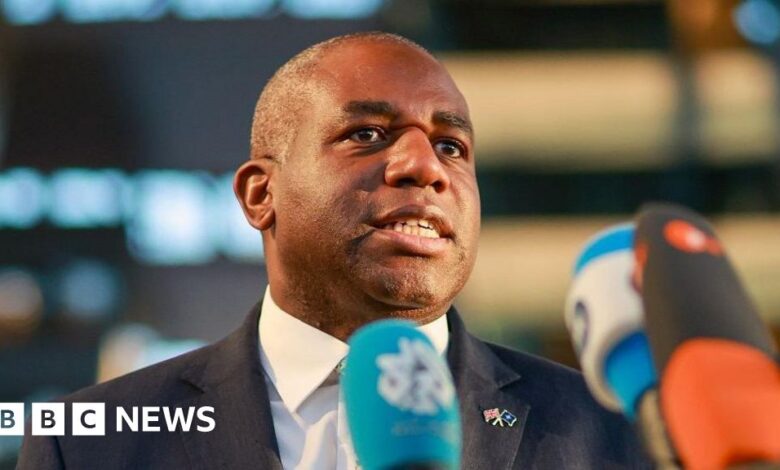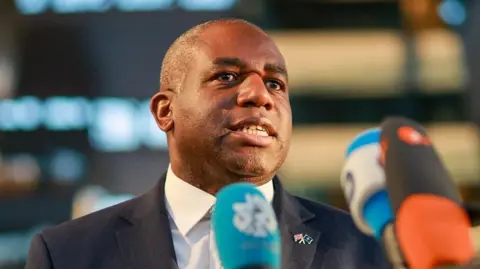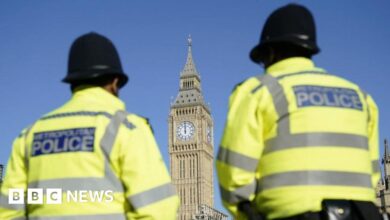No 10 rejects David Lammy suggestion of US protectionism

Political reporter
 EPA
EPADowning Street has rejected suggestions by the foreign secretary that the latest wave of US tariffs marks the return of a new era of “protectionism”.
Earlier David Lammy said the British people would be “very concerned” about the impact of President Donald Trump’s announcement, which means nearly all UK exports to the US are facing a 10% levy from Saturday.
The government has said it is focused on ongoing negotiations to strike a deal with the US but it has not ruled out retaliating.
Global stock markets have slumped since Wednesday’s announcement of blanket 10% tariffs, with higher rates for countries branded the “worst offenders” in their trade policies by Trump.
Asked whether it was time for the UK to stand up to Trump, Lammy, who was meeting Nato counterparts in Brussels, told reporters: “I regret the return to protectionism in the United States, something that we’ve not seen for nearly a century.”
He said negotiations to agree an economic deal with the US were ongoing, adding: “We have been absolutely clear that all options are on the table as we ensure the national interests of the British people, who will be very concerned at this time about how this affects the bottom line for them and their economic welfare.”
Protectionism is attempting to boost domestic industries using restrictions like tariffs, to shield them from foreign competition.
It became widespread in the 1930s, as countries sought to protect their economies from a global depression.
The idea is that it encourages companies and consumers to buy locally-produced goods.
However, critics say this will push up prices, as firms pass on increased costs to customers.
If some companies import fewer foreign goods this would increase demand for local products, which could also push up prices.
Asked whether the foreign secretary had been speaking for the government when he said he regretted the “return to protectionism”, a Number 10 spokesman said: “You have the foreign secretary’s words, and you have the prime minister’s words from yesterday.
“This is not a short-term tactical exercise, it’s the beginning of a new era… we have to understand the changing world when it comes to trade and the economy.”
On Thursday, Prime Minister Sir Keir Starmer said the tariffs would “clearly” have an economic impact on the UK and globally, as he warned of a “new era”.
Pressed over whether the PM would characterise it as a “new era of protectionism”, the spokesman said: “No, I wouldn’t characterise it in any particular way apart from the fact that the global economic landscape is shifting, and we need to shift with it.”
On Thursday, Trump claimed Sir Keir was “very happy” with how the UK had been treated, adding that the pair “have a very good dialogue”.
Asked whether this characterisation was accurate, Downing Street said the government was “disappointed” by the tariffs on the UK.
However, ministers have also suggested the lower rate levied on the UK compared to other countries “vindicated” the government’s approach.
Other leaders have been more vocal in their criticism, with French President Emmanuel Macron branding the decision to impose 20% tariffs on the EU as “brutal and unfounded”.
The prime minister is expected to hold calls with international leaders this weekend to discuss how to respond to the new tariffs.
It is understood the conversations are likely to be with European and Commonwealth leaders, with no call to President Trump currently anticipated.
The UK is drawing up a list of US products it could hit with retaliatory tariffs if a deal is not reached.
However, the government is hoping that negotiations with the US can avoid the need for this.
The BBC has been told any deal would also focus on technology, as well as agriculture – a controversial area in previous trade talks.
Ministers have suggested the UK could change the taxes charged on global tech firms as part of a deal.
The UK exported almost £60bn worth of goods to the US last year, mainly machinery, cars and pharmaceuticals.
A separate 25% tariff has been put on UK car exports, as well as steel and aluminium products.
The government’s official forecaster estimates that a worst-case scenario of a trade war, with 20% tariffs between the US and the rest of the world, could reduce UK economic growth by 1%.
This would wipe out the headroom the chancellor has to meet her spending and borrowing rules, and could mean further tax rises or spending cuts.






